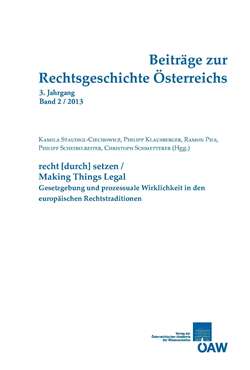
Beiträge zur Rechtsgeschichte Österreichs 2 / 2013, pp. 581-593, 2014/01/30
recht [durch] setzen - Making Things Legal.
Gesetzgebung und prozessuale Wirklichkeit in den europäischen Rechtstraditionen

In the Age of New Imperialism (1870–1914), the African continent was partitioned by several European powers, which collided in their ambitions to seize territory. The protectorate treaty, concluded between Africans and Europeans, formed the main mode of acquiring title to land. These treaties put the door ajar to the acquisition of full and all comprehensive sovereignty, and, therefore, the regulation and administration of internal affairs, like the allocation of property rights and landownership. Mainly by way of decrees the Europeans took over the internal administration of the protectorate. The European administration in Africa soon implemented the concession system, expropriated the indigenous population of their lands, and placed the African peoples in reservations. It is assessed whether these practices were in accordance with contemporary legal standards.